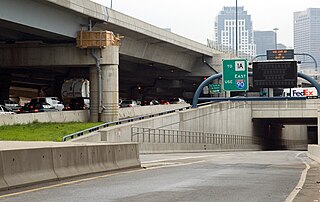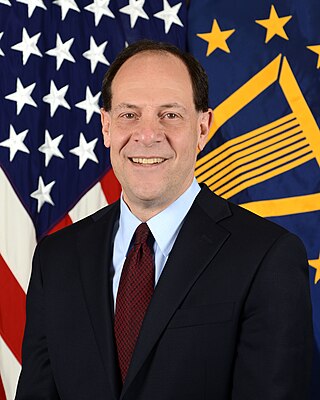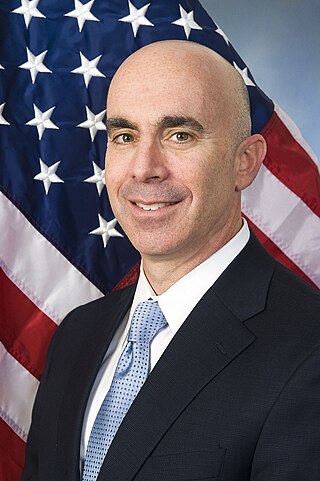Career
Cerasoli is retired from over 37 years of public service in the Commonwealth of Massachusetts and the City of New Orleans,Louisiana.
Massachusetts
He began his public service career in the Massachusetts House of Representatives in 1970 [1] and served as chairman of the House Post Audit and Oversight Committee, [2] a "fiscal watchdog panel". [3] During his time,he investigated the matter of Massachusetts' prisons giving furloughs to some murderers, [4] prompted by the well-publicized Willie Horton story. In 1989,when House Speaker George Keverian demanded that he and other representatives either support a bill for higher taxes or lose their jobs,Cerasoli resigned instead,knowing that he could not support the bill. [5] [6]
In 1991,Cerasoli was chosen unanimously to serve as the Inspector General (IG) of the Commonwealth of Massachusetts. [7] He launched several investigations and issued many reports but is most widely known for pointing out flaws in the Big Dig highway construction project through the city of Boston. [8] [9] The report would prove to be an "I told you so" when part of the tunnel would later collapse as a result of "cutting corners",causing one death. Although then-outgoing Massachusetts governor Paul Cellucci removed funding for the state IG in his next budget,the Massachusetts House of Representatives changed the figures to include $2.3 million for the office,defending it from what was widely seen as retribution for criticism of the governor's handling of the Big Dig. [10] Cerasoli was one of two finalists in a run for Inspector General of the United States House of Representatives,but there was widespread speculation that a Republican candidate would instead be chosen due to Republican control in the House. [1]
After retiring from his post,he taught at Eastern Nazarene College and the local community college, [11] [12] in his home town of Quincy,Massachusetts. [13] He also taught ethics courses in several African nations and other countries around the world. [14]
New Orleans
Cerasoli left retirement in 2007 when he was unanimously voted [14] to become the first-ever Inspector General for the City of New Orleans, [15] [16] a post that "was created in late 2006 by the City Council to send a message that New Orleans could be trusted to spend federal recovery aid after Hurricane Katrina," [17] although the City Charter was amended to require an office as early as 1995. [18]
The position required that Cerasoli start the office from scratch. Initially without a budget beyond $250,000,no office,no staff,and no car,Loyola University President Kevin Wildes,the chairman of the city's Ethics Review Board,provided Cerasoli temporary office space in the stacks at the university library. [19] [20] [21] By a vote of the citizens of New Orleans,a city charter amendment was passed to secure funding for the office, [22] roughly 3/4 of one per cent of the city budget. [21] The State of Louisiana also showed unanimous support for Cerasoli's office by widening the powers of the office and making them part of state law in House Bill 80. [23] The office released its first report in December 2008,on the city's take-home-car policy. It revealed that the city allows 273 employees,not including the mayor or the police department,take-home cars in spite of a city ordinance that limits the number to 60,and calculated that the city could save roughly $1 million by complying with that law. [24] Other investigations were initiated,but no reports have yet been published because the investigations are ongoing. [25]
Despite state and citizen support,Cerasoli ran into several roadblocks with city administration, [26] including a shipment of computers that was improperly sent to City Hall,where they were kept in the basement for two weeks and some of the boxes were opened. Upon receiving them at their office,the IG staff proceeded to wipe their memories in order to reverse any potential tampering. [27] Another notable obstacle to the establishment if the IG office was Mayor Ray Nagin's cancellation of law enforcement equipment purchases,despite the IG office's status as a law enforcement agency in the city charter amendment. [28] Cerasoli received support from officials such as Councilwoman Shelley Midura,who said that Nagin used "inflammatory language and limited executive branch resources to fight a non-issue." [28] New Orleans CityBusiness reported the Louisiana state IG as having said that "weapon purchases by inspectors general are routine" and state senator J.P. Morell as saying that Cerasoli was "reasonable" and,"unless you're a city official doing something wrong with contracts ... there's no reason to be afraid of the office." [28]
Cerasoli resigned in January 2009. He cited recent health concerns,two non-cancerous growths surgically removed in December and two other potentially cancerous growths yet to be removed. [25]
In the United States, Office of Inspector General (OIG) is a generic term for the oversight division of a federal or state agency aimed at preventing inefficient or unlawful operations within their parent agency. Such offices are attached to many federal executive departments, independent federal agencies, as well as state and local governments. Each office includes an inspector general and employees charged with identifying, auditing, and investigating fraud, waste, abuse, embezzlement and mismanagement of any kind within the executive department.

Harry Lee was an American law enforcement officer best known as the long-time sheriff of Jefferson Parish, Louisiana. He was first elected in 1979 as the thirtieth sheriff, and was re-elected six times, having served twenty-eight years and six months.

Clarence Ray Nagin Jr. is an American former politician who was the 60th Mayor of New Orleans, Louisiana, from 2002 to 2010. A Democrat, Nagin became internationally known in 2005 in the aftermath of Hurricane Katrina.

Interstate 610 (I-610) is a 4.52-mile-long (7.27 km) auxiliary route of I-10 that lies almost entirely within the city limits of New Orleans, Louisiana, bypassing its Central Business District.

The International Trade Mart was a New Orleans–based organization promoting international trade and the Port of New Orleans, Louisiana, United States. The organization was founded in 1946, and merged with International House in 1968, when it was renamed to World Trade Center New Orleans.

The first round of the New Orleans mayoral election of 2006 took place on April 22, 2006; a runoff between incumbent Mayor Ray Nagin and Louisiana Lieutenant Governor Mitch Landrieu took place on May 20, resulting in reelection for Mayor Nagin. The Mayor of New Orleans is the top official in New Orleans' mayor-council system of government.

U.S. Highway 90 Business is a business route of U.S. Highway 90 located in and near New Orleans, Louisiana. It runs 14.25 miles (22.93 km) in a general east–west direction from US 90 in Avondale to a junction with Interstate 10 (I-10) and US 90 in the New Orleans Central Business District.

Interstate 10 (I-10), a major transcontinental Interstate Highway in the Southern United States, runs across the southern part of Louisiana for 274.42 miles (441.64 km) from Texas to Mississippi. It passes through Lake Charles, Lafayette, and Baton Rouge, dips south of Lake Pontchartrain to serve the New Orleans metropolitan area, then crosses Lake Pontchartrain and leaves the state.

Lurita Alexis Doan is a businesswoman, political commentator, and former Republican appointee who was the administrator of the United States General Services Administration, the government's contracting agency, from May 31, 2006, to April 29, 2008, during the administration of Republican U.S. President George W. Bush. She is the first woman to have held this position.
The Cripple Creek Theatre Company is a grassroots, non-profit theatre company in New Orleans, Louisiana, United States, known for producing productions with large, diverse casts. The company was founded in December 2005 by Andrew Kingsley and Andrew Vaught for the purpose of instigating action toward social and economic justice in the South. The founders both attended Kenyon College in Gambier, Ohio, where they studied American history and theater. The theatre has been identified a driving force in the recovering city.

The Big Dig ceiling collapse occurred on July 10, 2006, when a concrete ceiling panel and debris weighing 26 short tons and measuring 20 by 40 feet fell in Boston's Fort Point Channel Tunnel. The panel fell on a car traveling on the two-lane ramp connecting northbound I-93 to eastbound I-90 in South Boston, killing a passenger and injuring the driver. Investigation and repair of the collapse caused a section of the Big Dig project to be closed for almost a full year, causing chronic traffic backups.

Glenn Alan Fine is the former principal deputy Inspector General of the Department of Defense and former Acting IG of the Department of Defense. Fine previously served as the Inspector General of the United States Department of Justice (DOJ) from 2000 until January 2011. He was confirmed by the United States Senate on December 15, 2000. Prior to his appointment as the DOJ Inspector General, Fine served as Special Counsel to the DOJ Inspector General from January 1995 until 1996, when he was made Director of the OIG's Special Investigations and Review Unit.

Ánh Quang "Joseph" Cao is a Vietnamese-American politician who was the U.S. representative for Louisiana's 2nd congressional district from 2009 to 2011. A member of the Republican Party, he is the first Vietnamese American and first native of Vietnam to serve in Congress.

The Inspector General of the Department of State heads the Office of the Inspector General of the Department of State and is responsible for detecting and investigating waste, fraud, abuse, and mismanagement in the United States Department of State. In the department, the Inspector General has a rank equivalent to an Assistant Secretary of State.

Earl Edward Devaney was an American government official who served as inspector general for the United States Department of the Interior and chairman of the Recovery Accountability and Transparency Board.

Stacy Aline Singleton Head is an American lawyer and former president of the New Orleans City Council.

The Office of Inspector General of the United States Central Intelligence Agency (CIA) is the independent overseer of the organisation. Since 2024, the office has been held by Robert Host. The first inspector general was appointed in 1952. The Central Intelligence Agency Office of Inspector General has worked on cases in collaboration with the United States Department of Justice and the National Security Agency Office of Inspector General.

Gerald Walpin was an American lawyer and author. He served as the Inspector General of the Corporation for National and Community Service (CNCS) from January 2007 until June 2009, when he was removed by U.S. President Barack Obama.

Steven Alan Linick is an American attorney and State Department official who served as Inspector General of the Department of State and led the Office of the Inspector General of the Department of State. In 2013, he was nominated by President Barack Obama and was confirmed by the United States Senate. Linick was removed from office by Donald Trump on May 15, 2020, effective in 30 days per federal law, with Stephen Akard appointed acting inspector general in the interim.
In April and May 2020, United States President Donald Trump dismissed the inspectors general (IGs) of five cabinet departments in the space of six weeks. The inspectors general removed were Michael K. Atkinson, Intelligence, on April 3; Glenn Fine (acting), Defense, April 7; Christi Grimm (acting), Health and Human Services, May 1; Mitch Behm (acting), Transportation, May 15; and Steve Linick, State, May 15. In four of the cases the announcement was made late on a Friday night in a classic Friday news dump. In several cases the fired IGs had taken an action which Trump disliked, so that the dismissals were widely described as retaliation. In two other cases, questions were raised about whether the dismissals related to ongoing IG investigations into the conduct of the cabinet secretary in charge of that department. The cumulative firings were often described as a "purge" or as a "war on watchdogs".

















